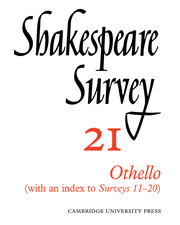Book contents
- Frontmatter
- ‘Othello’: A Retrospect, 1900–67
- The Two Parts of ‘Othello’
- ‘Othello’: A Tragedy Built on a Comic Structure
- ‘Othello’ and the Pattern of Shakespearian Tragedy
- ‘Othello’, ‘Lepanto’ and the Cyprus Wars
- Iago—Vice or Devil?
- Thomas Rymer and ‘Othello’
- Delacroix’s Tragedy of Desdemona
- Verdi’s ‘Otello’: A Shakespearian Masterpiece
- William Hervey and Shakespeare’s Sonnets
- Imagery and Irony in ‘Henry V’
- Shakespeare and the Actors: Notes towards Interpretations
- The Year's Contributions to Shakespearian Study 1 Critical Studies
- 2 Shakespeare’s Life, Times and Stage
- 3 Textual Studies
- Index to Volume 21
- General Index to Volumes 11–20
- Plate Section
The Year's Contributions to Shakespearian Study 1 - Critical Studies
Published online by Cambridge University Press: 28 March 2007
- Frontmatter
- ‘Othello’: A Retrospect, 1900–67
- The Two Parts of ‘Othello’
- ‘Othello’: A Tragedy Built on a Comic Structure
- ‘Othello’ and the Pattern of Shakespearian Tragedy
- ‘Othello’, ‘Lepanto’ and the Cyprus Wars
- Iago—Vice or Devil?
- Thomas Rymer and ‘Othello’
- Delacroix’s Tragedy of Desdemona
- Verdi’s ‘Otello’: A Shakespearian Masterpiece
- William Hervey and Shakespeare’s Sonnets
- Imagery and Irony in ‘Henry V’
- Shakespeare and the Actors: Notes towards Interpretations
- The Year's Contributions to Shakespearian Study 1 Critical Studies
- 2 Shakespeare’s Life, Times and Stage
- 3 Textual Studies
- Index to Volume 21
- General Index to Volumes 11–20
- Plate Section
Summary
One of the most interesting developments in Shakespearian criticism over the last two decades has been the growing readiness of scholars to suggest connexions between the plays other than those sanctioned by the time-honoured groupings. The central argument advanced by R. G. Hunter in his provocative book Shakespeare and the Comedy of Forgiveness is that six of the plays— Much Ado About Nothing, All’s Well That Ends Well, Measure for Measure, Cymbeline, The Winter’s Tale, and The Tempest —belong together, since they are all examples of a particular kind of comedy, hitherto unrecognized, that had its beginnings in the Middle Ages. The characteristic features of this sub-species are that the protagonist errs grievously, comes to feel contrition, and is ultimately forgiven, either by God in the Medieval Drama, or, in Elizabethan Drama, by the other characters who have suffered as a consequence of his actions. The audience, Hunter maintains, is expected to recognize its kinship with the erring figure, since all men are sinners, and to grant him the same charity and forgiveness that the characters in the play do. Within this general pattern there are, however, distinctions to be made. Measure for Measure and The Tempest are concerned primarily with offences against the law, committed by Angelo and Alonso, whereas Claudio in Much Ado, Bertram, Posthumus, and Leontes are offenders against romantic love.
Information
- Type
- Chapter
- Information
- Shakespeare Survey , pp. 127 - 141Publisher: Cambridge University PressPrint publication year: 1969
